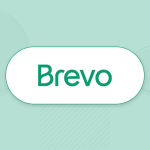Everyone loves the idea of building a $10,000 a month business because it sounds neat and achievable, like one of those round numbers that just screams success. If you follow us on X (you should!), you probably also see the Stripe MRR screenshots popping up and you can picture yourself in a cafe in Bali, sipping an oat flat white, nodding at Stripe notifications as if you’ve cracked the code of capitalism. Then, reality arrives in the form of overdue invoices, self-doubt, and the realisation that no one cares about your latest new feature.
Entrepreneur and investor Simon Squibb has lived both sides of that fantasy. After thirty-five years of starting, selling, and investing in businesses, he’s built more than most people will in a lifetime. His company HelpBnk was valued at over $50 million in just a year, and he’s been rich, broke, and everything in between. When Simon talks about business, there’s no nonsense, no motivational quotes about manifesting success (although we do love a good quote!), just raw experience and the occasional verbal punch in the face.
He believes anyone can build a $10,000 a month business if they stop chasing the wrong things and start thinking like an entrepreneur who actually wants to win. These Simon Squibb business lessons are about reality, not fantasy:
1. Having No Money Might Be the Best Thing That Happens to You
Most people convince themselves they need money before they can start a business, and Simon calls that complete nonsense. In his experience, having money early on makes people lazy, careless, and unimaginative. Once you’ve got cash, you stop being scrappy and start thinking like a middle manager, you hire or outsource too quickly, spend too freely, and stop questioning what actually works.
He points to WeWork as the perfect example of what happens when you mistake funding for validation. Thirty billion dollars later, the company was a spectacular mess whereas Airbnb, on the other hand, started by selling novelty cereal boxes called “Obama-O’s” just to survive. It sounds absurd, but it forced them to talk to real customers, understand real problems, and make real money.
Being broke sharpens your mind in a way money never will, when you’ve got nothing to lose, you take risks that people with comfort and savings would never dream of taking.
2. Pain Is the Real Teacher
You’ve probably heard the saying that “if you don’t pay, you don’t pay attention.” Simon thinks that’s rubbish. It’s not payment that wakes you up; it’s pain. Pain forces you to act, to learn, and to keep pushing when every sensible person would have quit.
He tells the story of his wife, who retrained in kinesiology after her mother was diagnosed with cancer. She was furious at being told there was nothing to be done, and that frustration pushed her to learn something new. Pain became the fuel that turned helplessness into action.
Every entrepreneur has that one irritation or injustice that drives them. It might be as small as an annoying daily inconvenience or as big as a personal tragedy, but it’s what keeps you from giving up. If you can build a business that solves a problem that once caused you pain, you’ll care too much to fail.
3. Fear Isn’t the Enemy, It’s the Engine
Simon says fear isn’t something to overcome but something to harness. It’s nature’s way of keeping you alert and moving. Fear sharpens your thinking, forces creativity, and builds resilience in a way comfort never can.
He compares it to being chased by a lion. The fear doesn’t paralyse you; it makes you faster, sharper, and absolutely focused on survival. That’s exactly how you should approach business. If you’re not feeling any fear, it probably means you’re not doing anything worth being afraid of.
Entrepreneurship is about training your “risk muscle.” You have to get used to feeling afraid and doing it anyway, because comfort never made anyone rich.
4. Do What You’re Brilliant At and Outsource the Rest
School taught you to fix your weaknesses. Business rewards you for ignoring them. Simon believes the secret to success is finding one thing you’re great at and becoming world-class at it while letting other people handle everything else.
He’s always been good at sales and communication, and that’s where he focused his energy. He’s terrible at geography and biology, and he’s never spent a second trying to improve them. You don’t need to be well-rounded; you need to be dangerously good at one thing that people will pay for.
If you hate doing your accounts, hire an accountant. If writing social media captions makes you miserable, get someone who loves it. The goal is to spend as little time as possible doing things that drain your energy, because energy is your real currency.
5. Stop Selling Time, Start Buying It
If you’re still trading hours for money, you’re already losing. Simon says rich people don’t sell time; they sell outcomes. The world doesn’t care how long it took you, only that the result works.
He tells the story of an engineer who fixed a broken submarine in fifteen minutes and invoiced $300,000. When the client complained, he explained that it took twenty years to know which part to hit. That’s the difference between being paid for time and being paid for skill.
Your mission is to get so good at what you do that people pay for results, not hours. Then you use that money to buy back your time, whether that means hiring a team, automating processes, or simply taking a day off without guilt.
6. Own a Piece of What You Build
A salary feels safe until the day it doesn’t. Ninety-six percent of people work to make someone else rich, and Simon says that’s the biggest trap of all. Real wealth doesn’t come from wages; it comes from ownership.
You don’t need to invest in stocks or crypto; you just need to own a slice of the thing you’re helping to build. The people who worked at Facebook for a decade and left with nothing learned that the hard way. If you’re pouring your talent and energy into a project, you deserve more than a paycheck. Equity isn’t a bonus—it’s your leverage.
7. Stop Guarding Your Ideas Like State Secrets
Simon hates when people ask him to sign an NDA. He says it’s the hallmark of an amateur. “Ideas are worthless,” he explains, “only execution has value.” People guard their ideas as if everyone’s waiting to steal them, but in reality, no one has the time, skill, or motivation to copy you properly.
If you share your idea, you might find collaborators, partners, or investors. If you keep it locked up, it dies quietly in your notebook. It’s not the first person with an idea who wins; it’s the first person who executes it well.
8. You Can’t Build a Business Part-Time Forever
Side hustles are fine for testing ideas, but Simon Squibb says you’ll never scale anything meaningful unless you go all in. There’s only so far you can go working evenings and weekends.
He advises people to get their costs down, build six months of runway, or secure one client who covers basic expenses before making the leap. If you’re not willing to back yourself full-time, you can’t expect anyone else to take your business seriously. Investors and customers can sense half-heartedness, and it’s rarely attractive.
9. Take Care of Your First Customers Like Royalty
Everyone’s obsessed with growth, more leads, more followers, more conversions, but Simon argues you don’t need hundreds of customers to build a business. You need three great ones and the discipline to treat them like gold, and we have seen this across so many of our Startup Series founder stories, like Nate Herk and the Uptrends guys who saw a much better return by moving away from lower value, higher volume B2C to focus on the higher value, lower volume B2B.
When he ran his creative agency Fluid, he focused entirely on making his first three clients ecstatic. One was so pleased with his work that Simon put them on a billboard as part of their campaign. Promoting his client made them look good and, by extension, made him look good too. That one gesture built more loyalty and reputation than any marketing spend could have.
If you obsess over keeping your early customers happy, they’ll become your best sales team. Ignore them, and you’ll spend the rest of your life chasing new ones to replace the ones who left.
10. Share the Rewards
If you want your team to care about your business as much as you do, give them a reason to. Simon believes that holding onto 100 percent of your company is one of the most expensive mistakes an entrepreneur can make. He’d rather own 10 percent of a thriving business than 100 percent of a miserable one that’s barely staying alive.
Giving equity to your employees doesn’t mean giving away control, it means giving them purpose. When people have real skin in the game, they work differently. They stay longer, think bigger, and treat the business like it’s their own, because it actually is.
Simon Squibb’s 10k business lessons aren’t about hacks or shortcuts. They’re about understanding the brutal truth that pain, fear, and ownership are what build real success. You don’t need to be the smartest or the luckiest person in the room; you just need to take responsibility for everything you build, keep learning, and never let comfort slow you down.






